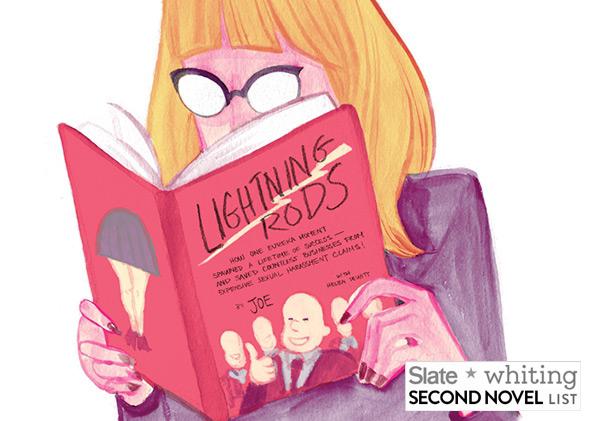“A genius is different from other people,” Helen DeWitt writes in her demented comic masterpiece Lightning Rods, which is the first of five books to be named this week to We Second That: The Slate/Whiting Second Novel List. “A genius doesn’t waste time like other people. Even when he looks like he is wasting time he may in fact be making the most productive possible use of his time.” DeWitt is writing about her hero, Joe, whose revolutionary sexual-harassment-abatement business sweeps across America. But I also read it as being about DeWitt in a way. Let me explain.
DeWitt wrote her second novel Lightning Rods about 15 years ago, before her first novel, The Last Samurai (2000), was published. But Lightning Rods was not published until 2011, after a torturous odyssey involving multiple publishing houses and rejections from nearly every publisher in New York. In blog posts, DeWitt has lamented the hours, weeks, and years her writing life has lost to the vagaries of the publishing industry; it’s tempting to view this book as the sort of work of genius that justifies those lost years, just as Joe’s eventual success follows his seemingly wasted time selling Encyclopedia Britannicas and vacuum cleaners. But DeWitt’s own view is a darker one than that—and her trials make Lightning Rods the ideal novel to kick off our list of terrific books suffering from Second Novel Syndrome. This week, we’ll feature all five of the books in short essays by our judges: me, Yiyun Li, Sarah McNally, Sasha Weiss, and Colson Whitehead. We want to pay tribute to these novels’ greatness, sure. But we also want you to buy and read them.
So let’s start with this corporate satire, one of the most singular books I’ve ever read. Joe’s revolutionary products, the “lightning rods” of the book’s title, are female employees who are installed into offices not only to type and fax and sit in meetings but to solve the problem of the sexual urges that high-powered male employees must battle at all hours of the day. “Women were being molested in the workplace,” Joe reasons, “solely because their colleagues did not have a legitimate outlet for urges they could not control.” Worse, due to expensive sexual-harassment complaints, “men who worked hard and had a valuable contribution to make were being put at risk, through no fault of their own.”
Once per day, a male employee with privileges can press a button on his computer to order a lightning rod. One of the firm’s lightning rods will then receive a discreet message on her computer; she is expected to report immediately to a stall in the ladies’ room, where she will replace whatever she’s wearing on her lower half with a short skirt and no underpants. She will then lie in a specially designed contraption that will slide her lower half through the wall into a stall in the adjacent men’s room, where the male employee, condom on, will sate his carnal desires, the better to go back to his office refreshed and focused and ready to make money. The women, too, handsomely remunerated for their additional tasks during the workday, go back to their desks, where they can plan for the glorious futures their fat paychecks will help them enjoy. (One former lightning rod, the book tells us, is now a justice on the Supreme Court!)
Lightning Rods is written in the vacuum-sealed language of self-help books and CEO as-told-tos—i.e., in the nearly empty verbiage of the American workplace. Take unpleasant, ineffective HR director Roy, who would like to tell us his thoughts about computers:
The thing to remember is, a computer is a tool. It’s there to help you do what you want to do. Used properly, a computer can be a valuable aid in determining what exactly it is that you want to do. But at the end of the day it’s just something to take care of things that would bore a human because they would take too long. It’s a machine, if you will. Neither more nor less.
It’s a machine, if you will. This small, perfect sentence—a tautology, a banality, a meaningless language unit delivered by a meaningless labor unit—encapsulates precisely the particular delights of reading Lightning Rods. In the novel, these language units pile atop each other, each signifying nearly nothing but together building a nightmare corporate world. One perfectly rational, anodyne statement follows another, until somehow PVC-clad female employees are shoving their asses through holes in the bathroom wall to provide male employees sex on demand. (The PVC is to ensure anonymity regardless of the lightning rods’ race and also because some male employees just won’t stop pissing on the women presented to them.)
Lightning Rods is therefore that true anomaly in fiction: a novel that works beautifully despite having no real characters, no real conflict, no real story. Instead it is borne along on the energy of DeWitt’s language and its own magnificently bananas internal logic. Lightning Rods is an immodest proposal: a sex comedy that pursues a single dirty joke much, much further than it ought to and, in doing so, skewers American capitalism with a purer, more invigorating hatred than any novel I can remember.

Photo by Aileen Son
Early in the book, Joe describes the recurring sexual fantasy that will eventually give rise to his stroke of genius: a woman leaning out an upstairs window, talking to a neighbor while a lodger “comes up behind her, slides his hands up her thighs, slides up the tight skirt, gives her an unexpected bonus on top of the rent.” While the man goes at it, our vantage point moves to the woman’s upper half, outside the window, where she’s carrying on her conversation, “brightly but with a strained expression.” I think I had that expression on my face while reading Lightning Rods; its pitch-dark take on the American Way reminds us that even as we go about our daily business, we’re all getting well and truly fucked.
—
Lightning Rods by Helen DeWitt. New Directions.
See all the pieces in this month’s Slate Book Review.
Sign up for the Slate Book Review monthly newsletter.
